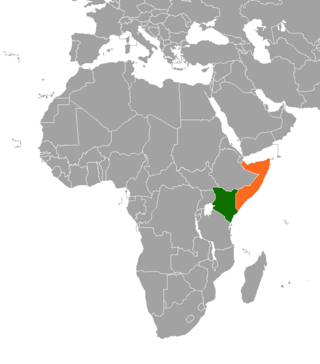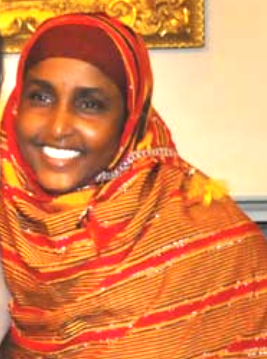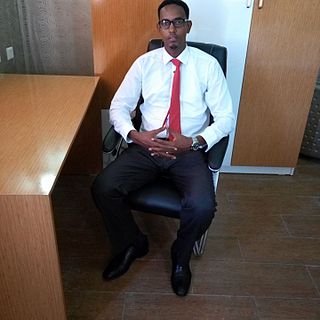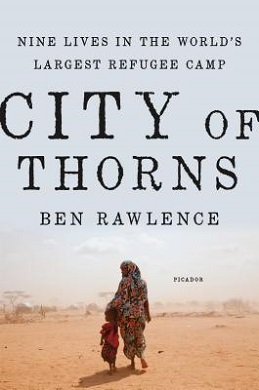Related Research Articles

A refugee camp is a temporary settlement built to receive refugees and people in refugee-like situations. Refugee camps usually accommodate displaced people who have fled their home country, but camps are also made for internally displaced people. Usually, refugees seek asylum after they have escaped war in their home countries, but some camps also house environmental and economic migrants. Camps with over a hundred thousand people are common, but as of 2012, the average-sized camp housed around 11,400. They are usually built and run by a government, the United Nations, international organizations, or non-governmental organization. Unofficial refugee camps, such as Idomeni in Greece or the Calais jungle in France, are where refugees are largely left without the support of governments or international organizations.

Dadaab is a semi-arid town in Garissa County, Kenya. It is the site of a UNHCR base hosting 302,805 registered refugees and asylum seekers in three camps as of 31 October 2023, making it one of the largest in the world behind Kutupalong refugee camp. The centre is run by the United Nations High Commissioner for Refugees, and its operations are financed by foreign donors. In 2013, UNHCR, the governments of Kenya and Somalia signed a tripartite agreement facilitating the repatriation of Somali refugees at the complex.

The North Eastern Province is one of the former provinces of Kenya. It had a land area of 127,358.5 km2, with its capital at Garissa. The North Eastern Province was carved out of the then Northern Frontier District (NFD) prior to independence.
Liboi is a town in Garissa County, Kenya, at the border with Somalia.
General Ismail Qasim Naji in Borama, Somalia was the chief of staff of the Transitional Federal Government (TFG) of Somalia and currently the Somali ambassador in Oman. He has served as a senior officer of the Somali army since the administration of Siad Barre, who was removed from power in 1991. Before the formation of the TFG, he also commanded the army of the predecessor Transitional National Government (TNG) of Somalia between 2002 and 2004.

REFUNITE, short for Refugees United, operates as a non-profit organization founded by David and Christopher Mikkelsen. Their primary aim is to assist refugees and internally displaced persons (IDPs) in locating their missing family members. The organization concentrates on utilizing online and mobile solutions to facilitate family reunification.
Jalalaqsi (Jalalassi) is a town in the south-central Hiran province of Somalia. It is situated on the Shebelle River, between Buuloburde and Jowhar. Jalalaqsi is among a few cities away from the main road of somalia that connects most of the cities in the nation, the main road pases Jimbiley which is 9km away from Jalalaqsi, yet there is no road that connects from Jimbiley to Jalalaqsi except rough road to Jalalaqsi

Occurring between July 2011 and mid-2012, a severe drought affected the entire East African region. Said to be "the worst in 60 years", the drought caused a severe food crisis across Somalia, Djibouti, Ethiopia and Kenya that threatened the livelihood of 9.5 million people. Many refugees from southern Somalia fled to neighboring Kenya and Ethiopia, where crowded, unsanitary conditions together with severe malnutrition led to a large number of deaths. Other countries in East Africa, including Sudan, South Sudan and parts of Uganda, were also affected by a food crisis.

Kenya–Somalia relations are bilateral relations between Kenya and Somalia. Both countries are members of the African Union and Non-Aligned Movement.

Farhiyo Farah Ibrahim is a Somali social activist and interpreter. She is an advocate for women's rights and reproductive health.
On 2 April 2015, gunmen stormed the Garissa University College in Garissa, Kenya, killing 148 people, and injuring at least 79. The militant groups Al-Qaeda and Al-Shabaab, which the gunmen claimed to belong to, took responsibility for the attack. The gunmen took over 700 students hostage, freeing Muslims and killing those who identified as Christians. The siege ended the same day, when all four of the attackers were killed. Five men were later arrested in connection with the attack, and a bounty was placed for the arrest of a suspected organizer.
Ben Rawlence is a British writer who has written three books: “The Treeline: the last forest and the future of life on earth” (2022) Radio Congo: Signals of Hope From Africa's Deadliest War (2012) and City of Thorns: Nine Lives in the World's Largest Refugee Camp (2016). From 2006 to 2013 he was a researcher for Human Rights Watch's Africa division. Rawlence has also written for The New York Times, The Guardian and London Review of Books. He lives in the Black Mountains, Wales where he is the founding director of Black Mountains College, an institution devoted to creative and adaptive thinking in the face of the climate and ecological emergency.

In 2017 a drought ravaged Somalia that has left more than 6 million people, or half the country's population, facing food shortages with several water supplies becoming undrinkable due to the possibility of infection.

Abbas Abdullahi Sheikh Siraji was a Somali politician who briefly served as the Minister of Public Works and Reconstruction until he was shot dead in Mogadishu in 2017.
Purity Kagwiria is a Kenyan feminist activist and executive director of Akili Dada.
Mohamud Abdullahi Sheikh Siraji is a Somali politician who was elected from the state of Jubaland as a member of Federal Parliament of Somalia on 15 February 2018. Mohamud is the younger brother of the late Minister for Public Works and Reconstruction Abass Abdullahi Sheikh Siraji.

City of Thorns: Nine Lives in the World's Largest Refugee Camp is a history biography nonfiction work published in 2016 by Picador in the UK and Thorndike Press in the US, and written by author, journalist Ben Rawlence. Generally, the book follows the stories of nine people narratively through their respective journeys through Dadaab, the world's largest refugee camp, home to about 350,000 people.
Steven Patrick Dennis, known as Steve Dennis, is a Canadian humanitarian worker who in 2012 was violently abducted from Dadaab refugee camp, Kenya, before being rescued in a gunfight by an armed militia. Dennis' litigation against his employer was the first time that a European court has ruled on the duty of care of aid workers.
Ifo Refugee Camp is a refugee camp in Dadaab in Kenya. It was established in 1991 with initial goal of accommodating refugees from Somalia due to the civil war which was ongoing.
Hagadera Refugee Camp is one of the three camps that make up the Dadaab Refugee Complex in Kenya. It was established in 1992 and is the largest camp under the Dadaab operation, managed by UNHCR Field Office Alinjugur. The camp is located in the Fafi district, neighboring Lagdera (Dadaab) district where the other two camps, Dagahaley and Ifo, are located.
References
- 1 2 3 4 5 Dumbuya, Mustapha (2016-10-10). "Meet Brownkey Abdullahi: Dadaab refugee camp's first female blogger". ONE. Retrieved 2022-02-23.
- 1 2 3 Klein, Rachel (11 Jan 2017). "Dadaab-born blogger: 'My nationality is refugee' | DW | 11.01.2017". DW.COM. Retrieved 2022-02-23.
- ↑ Vogt, Heidi (2016-05-14). "Kenya's Push to Close World's Largest Refugee Camp Fuels a Sense of Displacement". Wall Street Journal. ISSN 0099-9660 . Retrieved 2022-02-23.
- ↑ Abdullahi, Brownkey (6 July 2016). "I was born and raised in a refugee camp: the world isn't as globalized as you think". World Economic Forum. Retrieved 2022-02-23.
- ↑ "Brownkey Abdullahi - Agenda Contributor". World Economic Forum. Retrieved 2022-02-23.
- 1 2 "Akili Dada - African. Women. Lead | Meet Brownkey, a Voice for Refugees" . Retrieved 2022-02-23.
- ↑ Kenya, Amnesty (2017-06-30). "The Forgotten Refugees of Dadaab –Warehoused". Amnesty International Kenya. Retrieved 2022-02-23.